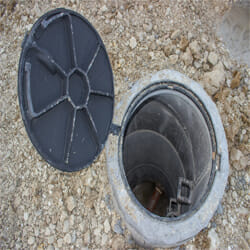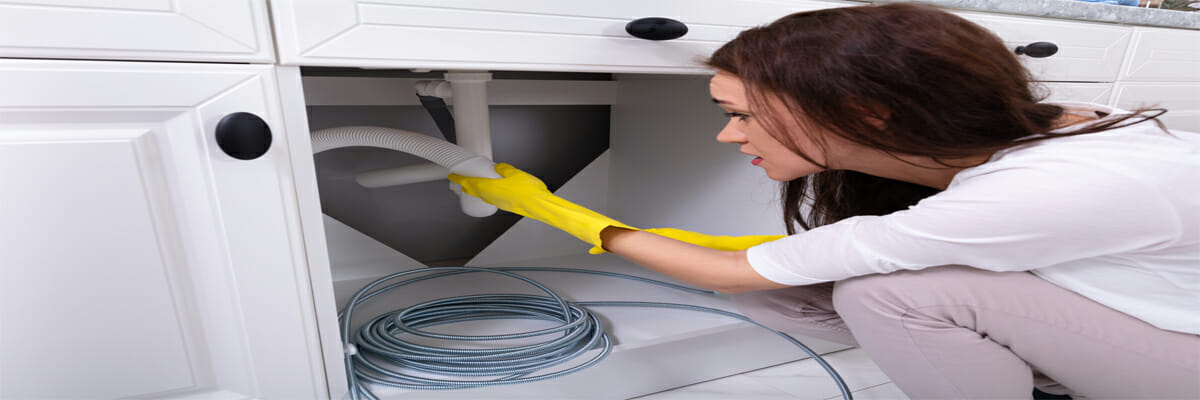A smelly drain can be a nuisance and an embarrassment in your home. Your kitchen or bathroom will not smell pleasant, and it can attract pests and germs. But what causes a smelly drain, and how can you clean it? We will answer these questions and give you some tips in this blog. And we will explore how to clean a smelly drain using natural remedies, commercial products, or professional help. Let’s get started!
Ways to Identify the Source of the Smell
Before you can clean your smelly drain, you need to figure out where the smell is coming from and what is causing it. This will help you choose the best method to solve the problem.

- Check all the drains in your home. If only one drain is smelly, then the problem is likely in that drain or its connected pipe. If multiple drains are smelly, then the problem may be in the main sewer line or vent.
- Run water through the drain and smell it. If the water smells bad, then the problem is in the drain itself or its trap. If the water smells fine, then the problem may be in the vent or somewhere else.
- Look for signs of leaks, cracks, or damage in the drain or seal. These can allow sewer gas or other odours to escape from the drain system.
- Use a flashlight to inspect the inside of the drain and its trap. Look for any clogs, debris, or buildup that may be causing the smell. You need to remove the drain cover or trap.
- If you cannot find the source of the smell by yourself, you may need to call a plumber or a drain specialist. They will inspect your drain system and locate the problem.
Once you have identified the source of the smell, you can proceed to clean your smelly drain. You can use one of the methods we will discuss in the next section.
How to Prevent Smelly Drains
The best way to deal with smelly drains is to prevent them from happening in the first place. By taking some simple precautions, you can avoid clogs, leaks, and odours in your drain system.
Here are some tips to prevent smelly drains:
- Avoid putting food scraps, grease, oil, coffee grounds, hair, soap scum, or other items. So, you can directly avoid clogs or smells in your drain. Use a drain strainer or garbage disposal to catch these items before they go down the drain.
- Flush your drain regularly with hot water to wash away any smell-causing buildup. You can also add some baking soda, vinegar, lemon juice, or salt. If it is mixed well with hot water, it will help disinfect your drain.
- Clean your drain cover and trap periodically to remove any dirt, hair, or debris that may accumulate there. You can use a brush, a plunger, a snake, or a wet-dry vacuum to do this.
- Check and replace your drain seal, vent, or trap if they are damaged or faulty. These components help prevent sewer gas or other odours from escaping your drain system.
- Ventilate your kitchen and bathroom well. This will reduce moisture and humidity, which promote bacterial or mould growth in your drain. A fan, window, or dehumidifier will do the work.
- Use mild or natural cleaners for your drain instead of harsh chemicals. As it can corrode your pipes or create toxic fumes. You can also use enzyme-based cleaners to break down organic matter and eliminate odours.
By following these preventive measures, you can keep your drain clean and fresh and avoid smelly problems in the future.
Also Read: How to Prevent Drain Blockages
How to Use Natural Remedies to Clean Smelly Drains
If your drain is smelly, you may want to try some natural remedies. As it allows you to clean without resorting to commercial products or professional help. Also, these remedies are usually cheaper, safer, and more eco-friendly. And they can be effective for mild to moderate cases of smelly drains.

- Lemon juice and salt: This is another acidic and abrasive mixture to clean and deodorise your drain. Squeeze the juice of one lemon down the drain, then sprinkle half a cup of salt on top. Keep the mixture still for 10 minutes, then run hot water over it.
- Borax and hot water: This is a powerful disinfectant for killing bacteria and mould. Pour half a cup of borax down the drain, then pour two litres of boiling water on top. Let the mixture sit for 10 minutes, then flush it with cold water. Repeat the process accordingly.
- Hydrogen peroxide and baking soda: This is an oxygenating and foaming agent. It can loosen and remove clogs and smells in your drain. Pour half a cup of baking soda down the drain, then pour half a cup of 3% hydrogen peroxide on top. Let the mixture sit for 10 minutes, then flush it with hot water. Do it until the smell is gone.
- Essential oils and hot water: This is a fragrant and soothing solution. Masking and eliminating smells in your drain is its main purpose. Just add 10 drops of your favourite essential oil into two litres of boiling water, then pour it down the drain. Let the mixture sit for 10 minutes, then flush it with cold water.
These natural remedies can help you clean your smelly drain without harming your pipes or the environment. However, you may need to use commercial products or seek professional help if they do not work.
How to Use Commercial Products to Clean Smelly Drains
You may want to try some commercial products specially designed for this purpose. This will help if natural remedies are not enough to clean your smelly drain. These products are usually stronger and more effective than natural remedies. And they can be useful for severe or stubborn cases of smelly drains. Yet, these are more expensive and harmful to your pipes or the environment. So, you should use them with caution and follow the instructions carefully.
Here are some commercial products you can use to clean your smelly drain:
- Drain cleaners: These chemical products can break down clogs and smells in your drain. They usually come in liquid, gel, or powder form. And they contain ingredients such as sodium hydroxide, sodium hypochlorite, or sulfuric acid. You just need to pour the recommended amount of the product down the drain. Then, wait for the specified time and flush it with water. Be careful not to inhale the fumes or touch the product with your skin or eyes. As it can cause burns or irritation. Also, do not mix different types of drain cleaners or use them with other cleaners. Dangerous reactions or explosions may result if not used correctly.
- Drain sticks: These are solid products that can release enzymes or bacteria. Digesting organic matter and eliminating smells in your drain is its main purpose. They usually come in stick or tablet form. Sodium bicarbonate, citric acid, or microorganisms are included in it. You need to insert one stick or tablet into the drain to use them. Then, let it dissolve slowly over time. You do not need to flush it with water or use any other cleaners with it. Yet, you may need to replace it every month or so to maintain its effectiveness.
- Drain brushes: These mechanical products can scrape or scrub clogs. They usually come in brush or snake form, and they have bristles or hooks. So, catching and removing debris from your pipes becomes easy with this. Just insert the brush or snake into the drain, then twist or push it until you reach the clog. Then, you need to pull it out along with the clog. Flush it with water or use a cleaner afterwards to remove any residue or smell.
These commercial products can help you clean your smelly drain quickly and effectively. You may need to seek professional help if they do not work or if the smell persists or worsens, which we will discuss in the next section.
How to Seek Professional Help for Smelly Drains

Here are some situations when you may need to seek professional help for your smelly drain:
- If the smell is coming from multiple drains or the main sewer line or vent. And it may indicate a complex problem that requires specialised tools or skills to fix.
- If the smell is accompanied by other symptoms such as slow drainage, water backup, gurgling noises, or leaks. This may be a sign of a severe or deep clog that cannot be removed by ordinary methods.
- Damage or corrosion in your pipes may be the reason for the smell. So, repairs or replacements to prevent further problems are required.
- The smell can be persistent despite your efforts to clean it. Then it shows a hidden or underlying issue that needs to be diagnosed and resolved.
You can contact a plumber or drain specialist in your area and explain your situation. They will then inspect your drain system and determine the cause and solution to your problem. You will get an estimate of the cost and time involved in the process. This will help you decide whether to hire them or not.
Seeking professional help can be the best way to clean your smelly drain and restore its normal function. But you should also follow the preventive tips we discussed earlier to avoid smelly drains in the future.
Related Articles:
Conclusion
A smelly drain can be a common and annoying problem in your home. But don’t panic, as you can solve it easily and effectively by following the tips we have discussed. Whether you use natural remedies, commercial products, or professional help, You can clean your smelly drain and enjoy a fresh and odour-free environment. Still, preventing it from happening in the first place is a good idea. So, you will save yourself time, money, and trouble in the long run.


 Enquire
Enquire